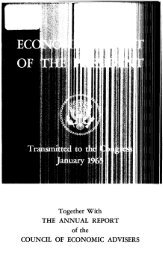Economic Report of the President
Report - The American Presidency Project
Report - The American Presidency Project
- No tags were found...
You also want an ePaper? Increase the reach of your titles
YUMPU automatically turns print PDFs into web optimized ePapers that Google loves.
system resulted. Price controls, when effective, led to shortages in<strong>the</strong> interstate market both because <strong>the</strong> interstate pipelines could notcompete effectively against intrastate pipelines for gas supplies, andbecause artificially low prices encouraged consumers to demandmore natural gas than <strong>the</strong>y would have o<strong>the</strong>rwise.Rising oil prices in <strong>the</strong> 1970s triggered occasional gas shortages ininterstate markets. Industrial use <strong>of</strong> gas was curtailed during periods<strong>of</strong> shortages, and many potential users <strong>of</strong> gas, both at <strong>the</strong> industrialand residential level, were proscribed from using gas. The abnormallycold winter <strong>of</strong> 1977 produced a severe interstate gas shortage, resultingin numerous factory shutdowns, thousands <strong>of</strong> lay<strong>of</strong>fs, ando<strong>the</strong>r serious problems. It was evident by <strong>the</strong> mid-1970s that <strong>the</strong> existingsystem <strong>of</strong> wellhead price controls produced serious inefficienciescausing <strong>the</strong> underproduction <strong>of</strong> gas for <strong>the</strong> interstate market and<strong>the</strong> misallocation <strong>of</strong> gas between <strong>the</strong> interstate and intrastate marketsand among different users within <strong>the</strong> interstate markets.The Natural Gas Policy Act <strong>of</strong> 1978The natural gas regulatory environment was changed substantiallyby passage <strong>of</strong> <strong>the</strong> Natural Gas Policy Act (NGPA) in 1978. This actwas intended to encourage production by deregulating <strong>the</strong> prices <strong>of</strong>newly discovered gas while restraining <strong>the</strong> growth <strong>of</strong> average gasprices through permanent controls on <strong>the</strong> price <strong>of</strong> older gas. TheFederal Energy Regulatory Commission replaced <strong>the</strong> Federal PowerCommission, and price controls were extended to gas sold in intrastatemarkets. Over twenty regulated categories <strong>of</strong> gas were created,each with its own initial ceiling price and rules for price escalationover time.The NGPA provides for <strong>the</strong> phased deregulation <strong>of</strong> <strong>the</strong> wellheadprice <strong>of</strong> most gas discovered after 1977, which should account for 40to 60 percent <strong>of</strong> all gas in January 1985, while a smaller volume <strong>of</strong>gas is scheduled for deregulation in July 1987. A small amount <strong>of</strong>high-cost new gas was deregulated under <strong>the</strong> NGPA in 1979. Mostgas to be deregulated in 1985 or 1987 is fixed until those dates at aprice, in inflation-adjusted dollars, leading to <strong>the</strong> oil equivalent pricelevel existing in 1978. The NGPA also includes "incremental pricing"provisions intended to allocate high-priced gas to industrial users,thus preserving lower prices for o<strong>the</strong>r users. Along with <strong>the</strong> NGPA,<strong>the</strong> Congress passed <strong>the</strong> Powerplant and Industrial Fuel Use Act; thislaw authorizes nonprice rationing <strong>of</strong> gas to counter <strong>the</strong> problems inherentin continued price controls.As with many efforts to regulate prices, <strong>the</strong> NGPA has created numerousproblems. Instead <strong>of</strong> producing <strong>the</strong> lowest cost gas suppliesfirst and moving successively to higher cost sources, producers areinduced by <strong>the</strong> different price categories to produce high-cost gas103
















